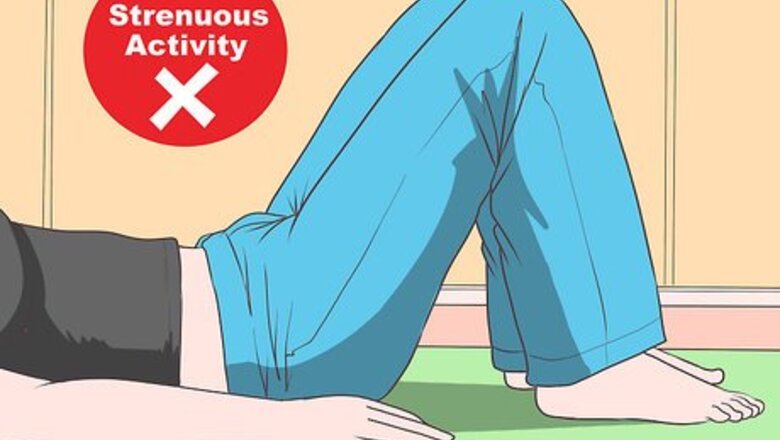
views
Caring for Inflammation at Home
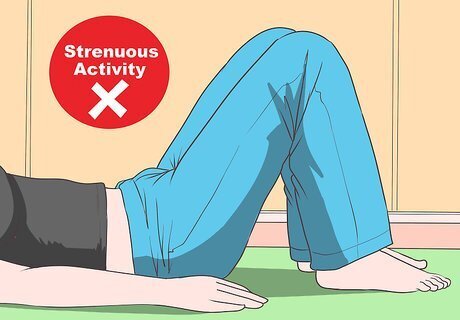
Give your knee a break. If your knee is inflamed you should give it as much rest as possible. Activity on the knee will only increase inflammation. Rest will give your body a chance to heal the underlying cause. Rest your knee as much as possible. Most people still need to walk and do simple movements with a knee that has inflammation. If this is the case for you, at least try to avoid strenuous activity on the knee. If the inflammation has not improved after 1-2 days, you should see your doctor.
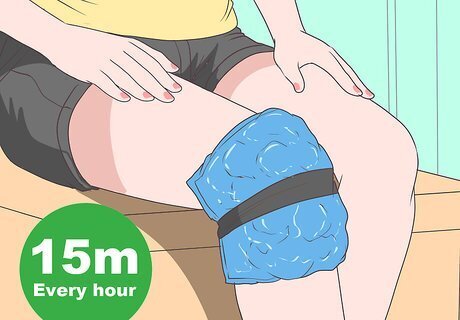
Apply cold to the area. Inflammation can be reduced by icing the knee. Reducing the temperature of the area constricts blood vessels, which reduces swelling. It also decreases pain by numbing the area. Apply an ice pack for 15 minutes of every hour. Doing this for 3 to 4 hours in a row will reduce inflammation drastically. You can use an actual ice pack to reduce inflammation. However, a bag of frozen vegetables works just as well. Wrap the frozen bag with a towel to protect your skin from the cold.
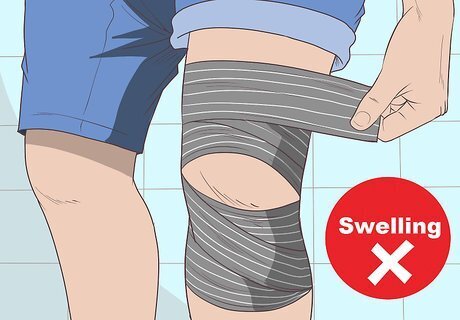
Compress the area. Putting some compression on a knee that has inflammation can prevent or reduce swelling. Compress the knee area by wrapping it in a compression bandage. Compression bandages are available at most drug stores and big box stores. Be sure that you don't wrap the area too tight. A very tight bandage can cut off circulation to the rest of the limb. To make sure it's not too tight, ensure that you can slip one of your fingers under the bandage and lift the finger slightly. Also, if your toes or feet start to become numb, it is a sign that you need to loosen the wrap. Give yourself a break from the wrap every few hours. Wrapping your knee can also help to support the knee if you do need to walk on it.
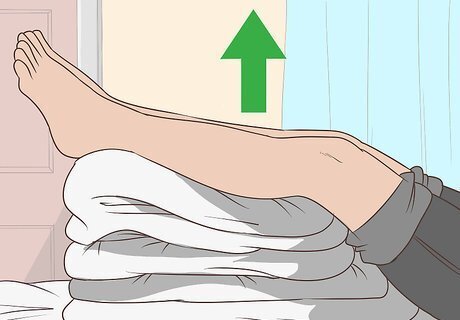
Elevate the knee. Lift your knee above your heart so that circulation in the knee is increased. This is easiest to do when lying down. Once you are lying down, have someone put pillows under your knee until it is elevated above your heart. Elevate your inflamed knee whenever you are resting. If you plan on watching TV, reading a book, or taking a nap, lift your knee while doing it.
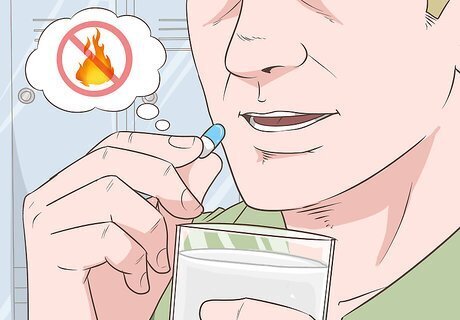
Take over-the-counter non-steroidal anti-inflammatory medication. Simple over-the-counter anti-inflammatory medications, such as ibuprofen, can reduce swelling in the knee. They will also reduce any pain you are having due to your injury. Follow the dosing directions supplied on the packaging. Talk to your doctor if you have any questions about possible drug interactions or problems taking anti-inflammatory medications with your specific health history.
Reducing Inflammation With Lifestyle Changes
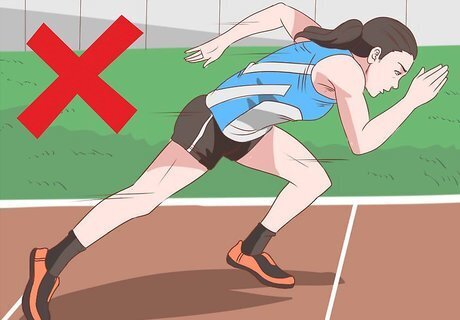
Eliminate activities that are hard on your knees. If you have repeated bouts of inflammation in your knee, you should start treating it more gently. Eliminate activities that aggravate your inflammation, such as high-impact exercises like running or tennis. A lot of inflammation is rooted in injuries to tendons and muscles around the knee. High-impact exercises can exacerbate old injuries to these areas because of the force these activities exert on the joints. Similarly, daily activities can exacerbate knee problems for those who have conditions like arthritis. Scale back your activities to accommodate your needs. Expert Answer Q What causes knee inflammation? Jonathan Frank, MD Jonathan Frank, MD Sports Orthopedic Surgeon & Joint Preservation Specialist Dr. Jonathan Frank is an Orthopedic Surgeon based in Beverly Hills, California, specializing in sports medicine and joint preservation. Dr. Frank's practice focuses on minimally invasive, arthroscopic surgery of the knee, shoulder, hip, and elbow. Dr. Frank holds an MD from the University of California, Los Angeles School of Medicine. He completed an orthopedic residency at Rush University Medical Center in Chicago and a fellowship in Orthopedic Sports Medicine and Hip Preservation at the Steadman Clinic in Vail, Colorado. He is a staff team physician for the US Ski and Snowboard Team. Dr. Frank is currently a scientific reviewer for top peer-reviewed scientific journals, and his research has been presented at regional, national, and international orthopedic conferences, winning several awards including the prestigious Mark Coventry and William A Grana awards. Jonathan Frank, MD EXPERT ADVICE Answer from Jonathan Frank, MD: The majority of people experience knee inflammation due to overuse. That could look like spraining the joints by turning them in some way that may not be best, resulting in inflammation. This Inflammation will typically present itself as not just pain, but also swelling and increased heat in the area as well.

Start doing activities that are good for your knees. Replace high-impact activities with those that are easier on your knees. Low-impact exercises, like swimming, will keep inflammation reduced and will increase your overall health. Some other great types of low-impact exercises include stationary bicycling, elliptical training, water aerobics, stretching, and chair exercises. Daily low-impact exercise will help your knees to heal over time.
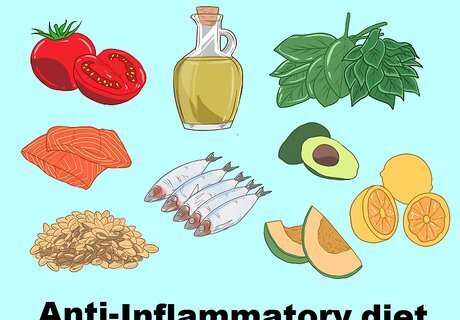
Eat an anti-inflammatory diet. Inflammation in your knee can be connected to general inflammation in your whole body. To reduce the amount of inflammation you are experiencing, try eating anti-inflammatory foods. Some of these include: Tomatoes Olive oil Green, leafy vegetables, including spinach, kale, and collard greens Nuts Fatty fish, including salmon, mackerel, tuna, and sardines Fruits
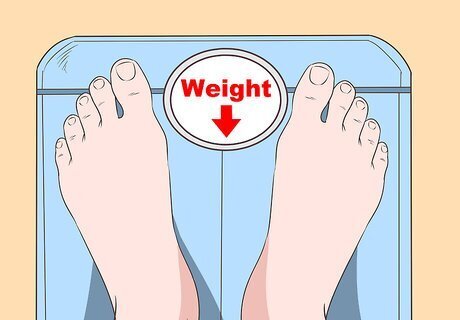
Reduce your weight. Pressure on an inflamed knee can further inflame it and can decrease its ability to heal. If you reduce the weight it has to carry on a daily basis, this can increase its ability to heal effectively. While many weight loss plans advocate for an increase in the exercise you are doing, keep in mind that you need to be careful with your already injured knee while you are doing that exercise.
Getting Medical Care for Inflammation
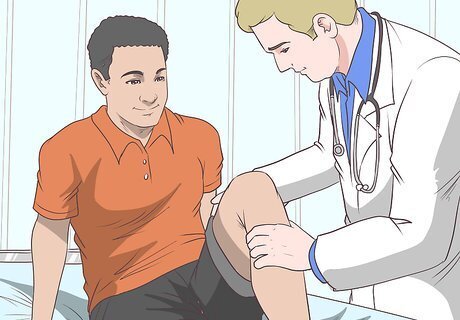
Visit your doctor for a definitive diagnosis and treatment. Knee pain and swelling should be treated by a doctor. A doctor can do tests like X-rays, MRIs, or an ultrasound that will give you a specific diagnosis about the issue. This will allow the doctor to prescribe treatments that are tailored to your specific problem. If you have repeated bouts of inflammation from an injury or condition like arthritis, talk to your doctor about them when you go in for a checkup. They may be able to give some suggestions about how to prevent and treat the problem. Knee inflammation can be broken down into acute and chronic. If you're experiencing pain for more than 6 weeks, that can be because of anything from osteoarthritis to lupus or another autoimmune disease.
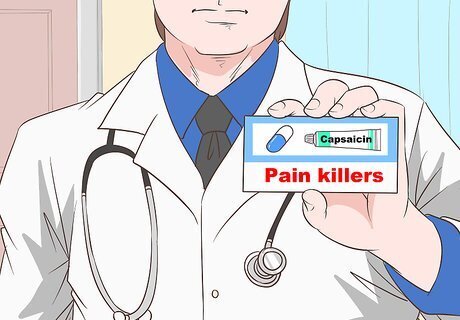
Discuss options for pain management. If over-the-counter pain medications are not reducing your pain satisfactorily, your doctor may be able to prescribe you something that will. Talk to the doctor about your level of pain and whether stronger painkillers, such as opioids or corticosteroids, would be appropriate for your condition. Your doctor may also prescribe capsaicin cream. This is a topical pain reliever that can help with joint inflammation. Corticosteroids are typically injected into the joint. This is done in a doctor's office and is a long lasting pain and swelling medication. Opioid pain medications, such as codeine, can be addictive. Be careful when using them and only use them when necessary to control pain.

Discuss surgical treatment options. In some cases of severe knee injury, your doctor may suggest surgical treatment. If the inflammation you are experiencing is caused by a severe injury that you have not been able to heal with other methods, consider this as an option for you. There are a wide variety of knee surgeries that may be suggested. They vary in intensity. Some people simply need to have an outpatient arthroscopic surgery. Others will need very invasive procedures that take months to heal from, such as a full knee replacement.




















Comments
0 comment